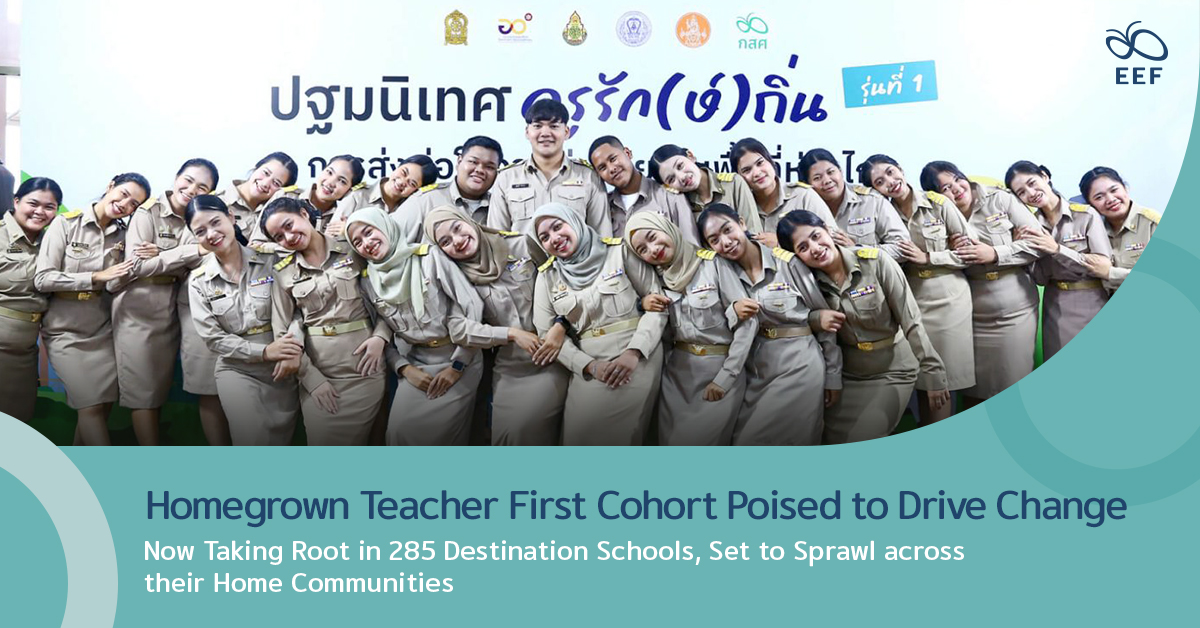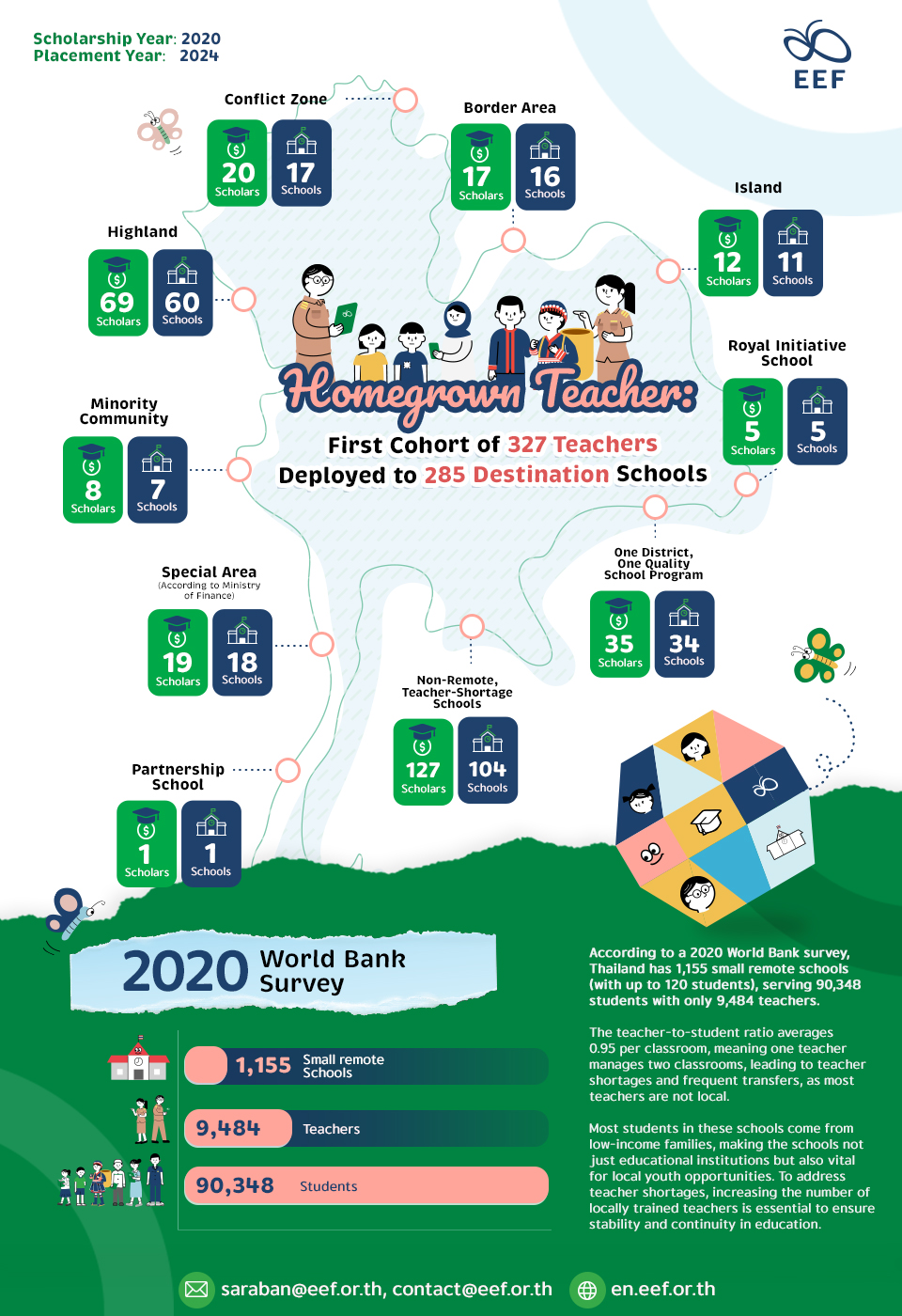
The “Homegrown Teacher” initiative seeks to cultivate “community developer-teachers” equipped with professional teaching competencies and 21st-century skills. These educators are trained to return to their hometown schools, often located in remote, highland, island, border, or ethnically diverse areas, to address the chronic teacher shortage and reduce future turnover. By fostering quality human capital and promoting sustainable educational equity, the initiative aims to bridge the gap in educational opportunities while uplifting underserved communities.
To achieve its goals, provided are Homegrown Teacher scholarships to highschool graduates from underprivileged and marginalized backgrounds who demonstrate academic excellence and a passion for teaching. These students are supported to pursue higher education in high-demand teaching fields, such as early childhood and primary education, at reputable teacher development institutions. Upon graduation, they are appointed as civil servant teachers under the Office of the Basic Education Commission (OBEC). Simultaneously, the initiative works to develop innovative teacher training models tailored to the unique contexts of remote schools and communities, ensuring that future educators are well-prepared to meet local challenges.
In the latest development of the Homegrown Teacher initiative, 327 locally trained educators have been deployed to 285 schools across diverse regions, including highlands, conflict zones, and minority communities. This effort addresses the critical need for stable, long-term teaching staff, as highlighted by a 2020 World Bank survey revealing that small remote schools often operate with just one teacher managing two classrooms. By prioritizing local recruitment, the initiative aims to ensure educational continuity and create opportunities for youth in low-income communities.

Homegrown Teacher: First Cohort of 327 Teachers Deployed to 285 Destination Schools
Scholarship Year: 2020; Placement Year: 2024
Deployment Area:
- Highland: 69 scholars, 60 schools
- Conflict Zone: 20 scholars, 17 schools
- Border Area: 17 scholars, 16 schools
- Remote Area: 14 scholars, 12 schools
- Island: 12 scholars, 11 schools
- Minority Community: 8 scholars, 7 schools
- Royal Initiative School: 5 scholars, 5 schools
- One District, One Quality School Program: 35 scholars, 34 schools
- Special Area (According to Ministry of Finance): 19 scholars, 18 schools
- Partnership School: 1 scholar, 1 school
- Non-Remote, Teacher-Shortage Schools: 127 scholars, 104 schools
According to a 2020 World Bank survey, Thailand has 1,155 small remote schools (with up to 120 students), serving 90,348 students with only 9,484 teachers. The teacher-to-student ratio averages 0.95 per classroom, meaning one teacher manages two classrooms, leading to teacher shortages and frequent transfers, as most teachers are not local.
Most students in these schools come from low-income families, making the schools not just educational institutions but also vital for local youth opportunities. To address teacher shortages, increasing the number of locally trained teachers is essential to ensure stability and continuity in education.

Looking ahead, monitoring and supporting these teachers for six years will be the Equitable Education Fund (EEF) Thailand, focusing on enhancing their academic, life, and vocational skills. Aimed at improving student learning outcomes, this continuous professional development also seeks to elevate the quality of schools and by extension communities. Given the cultural, ethnic, and geographical diversity of these areas, educators more often than not take on unconventional roles in addition to that of teaching, such as managing student dormitories, preparing meals, or responding to natural disasters. Complementing these efforts will be the Ministry of Education through policies like special academic rankings for teachers in special areas, increased per-student funding for small and opportunity-expanding schools, and budget allocations for satellite-based teaching resources in understaffed schools. Over the next five years, the Homegrown Teacher initiative anticipates deploying approximately 1,500 teachers across 1,300 schools nationwide.
A shining example of a similar initiative can be found in Illinois, USA, with the “Grow Your Own Teachers” (GYO) program, which successfully tackled teacher shortages and championed diversity in the teaching workforce. From 2020 onwards, the initiative made strides by recruiting candidates from underserved communities, equipping them with professional training, and encouraging them to return and teach in their hometowns. Key achievements include forgivable loan programs and enhanced support systems, though its long-term sustainability hinges on continued investment in financial aid and resources. Similarly, mirroring this success is Thailand’s “Homegrown Teacher” initiative, aligning with the Equitable Education Fund (EEF) Thailand’s mission to build human capital, bridge educational gaps, and empower underprivileged youth through higher education. By nurturing local talent and fostering upward mobility, not only does the initiative help graduates earn incomes up to five times higher than their families, but it also breaks the cycle of poverty, driving meaningful socio-economic progress.

Marking a significant step toward addressing Thailand’s chronic teacher shortages and fostering educational equity in underserved communities is the deployment of the first cohort of 327 Homegrown Teachers. By placing these locally trained educators in 285 schools across remote, highland, border, and minority areas, the initiative not only ensures teaching continuity but also empowers communities to take ownership of their educational development. However, the journey is far from over; over the next five years, the initiative aims to deploy 1,500 teachers to 1,300 schools, which requires sustained support, innovative training models, and robust policies to address the unique challenges of these regions. This ongoing effort underscores the importance of collective action to bridge educational gaps and create opportunities for all.
All For Education is all about people; only when all is in for education is Education For All. Join the movement to reduce educational inequality. Support the EEF by donating to fund research, partnerships, and assistance for children, youth, and adults in need of educational support. Click the link to contribute today and help create a society where education is open and equal for all. Together, we can make a lasting impact.

